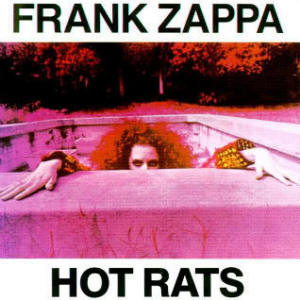|
You are reading the older HTML site Positive Feedback ISSUE 46november/december 2009
Frank Zappa Hot Rats
Reprise/Classic RS6356 Frank Zappa's second album that he recorded sans his band the Mothers of Invention was the first ever rock discs I know of to be recorded on a sixteen-track tape machine. This newfangled multi-track technology clearly fits into his ever expanding musical vision, but whether one considers this vision a good or bad thing doesn't really matter very much—there is no denying that his ambitions were light years away from most other "popular" musicians at the time. With the benefit of hindsight, many consider this album from 1969 to incorporate jazz/rock-fusion elements, but putting labels on the music other than calling it "Frank Zappa" doesn't really come close to describing the music herein. While others at the time were muddled in self-indulgence, he was creating a sonic canvas that was light-years ahead of the pack, and more akin to Dadaism (and of course infused with a good dose of humor) than anything else any other band at the time. He is practically giving the rock world a seminar, filling the record with amazing Frank Zappa-eque guitar solos, Ian Underwood's dexterous reed and mallet playing, and great showings by the then practically unknown Captain Beefheart (who's vocals on "Willie The Pimp" are straight out of his twisted brilliance that he displays on his Trout Mask Replica) and pushes to the limits the talents of electric-violinists Jean-Luc Ponty and Sugar Cane Harris. And to top it off, there are some downright catchy melodies infused within the improvisations and clever scoring that Zappa coaxes from his plethora of influences, as demonstrated on the now classic opening number, "Peaches en Regalia". Even on the somewhat meandering pentatonic jam on side two's "The Gumbo Variations" there is a blistering violin solo by Harris, promptly redeeming it and further establishing itself as a classic track on a classic album that demands frequent repeated listenings. But far be it from me to critique Frank Zappa's brilliance. Sonically, I have a bit more of a fully formed opinion coming from an audiophile's perspective, and I assume Classic Records intends to market this product not only to those who have the same musical tastes as me, but those with the same auditory aspirations as well. Briefly, it is the best version of this album I've ever heard, trouncing the remixed CD version that's currently on the market, no mean feat giving that it isn't nearly as bad as some other "classic rock" artist's labels have hoisted upon the public. And it is better than my mustard-yellow label US Reprise LP pressing, that's for sure. But other than that, I don't think it really reaches the upper echelon of audiophiledom. But that's without doubt not Classic Record's fault, this pressing is as great as one should expect from them—200 grams of heavy flat vinyl, with silent surfaces and deeply cut grooves. The deficiencies in its ultimate sound quality might be in at least part due to the fact that this was using a recording technology that was in its infancy. The tape machines used in the foremost studios of the day were eight-track, and for those machines a width of one-inch tape was fine, but sixteen tracks printed onto what I assume was this same width of tape this early in the game might have something to do with the somewhat thin (no pun intended) sound that results (as a worthy of note aside, at the end of the analog recording-studio era, two-inch tape was the norm for the by then standard 24-track machines). So, the subsequent loss of lower bass and overall sonic body on Hot Rats is not so bad, really, but is quite noticeable—at least on my system. But the overall resolution of all the instruments, which includes the basic tracks and all that was subsequently laid down on the tape (including manic instruments that were recorded at half-speed), are brought marvelously to the fore thanks to Classic Records. But it is worth repeating (even if I didn't yet say this) that when listening to this record one need not focus on sound quality, given the fact that one is listening to a musical genius and his posse in their prime.
|

